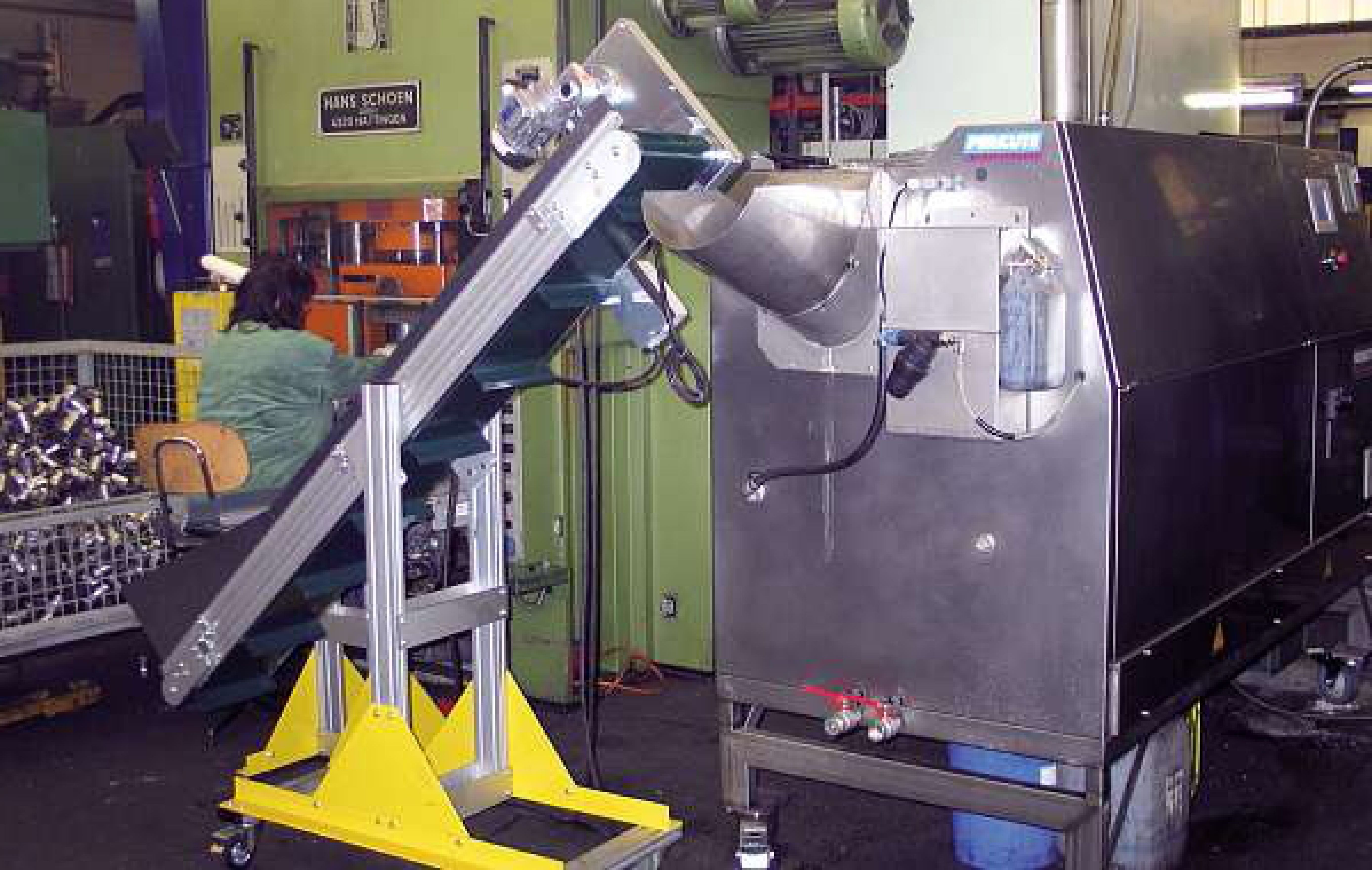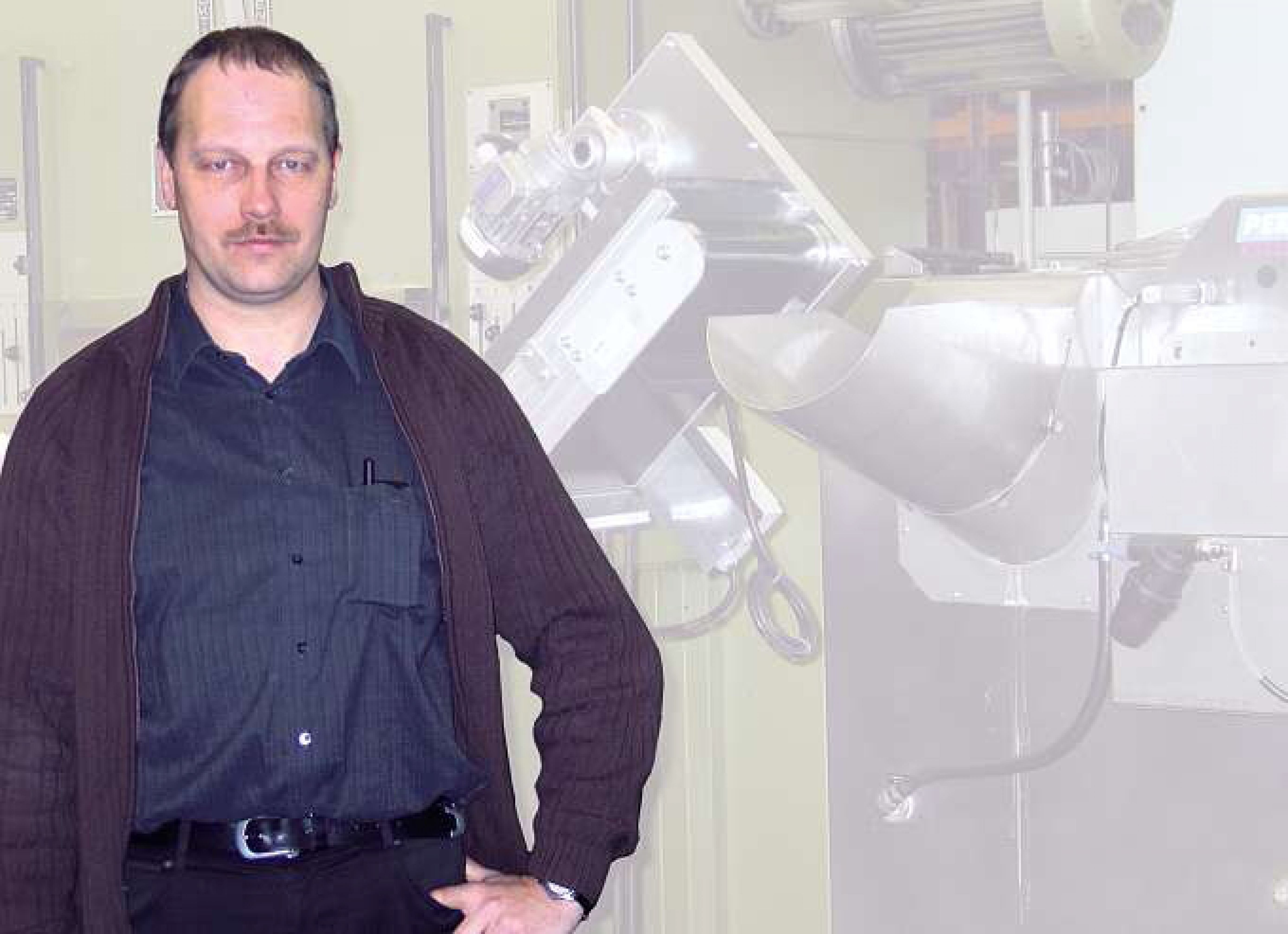The second link in the chain of supply is dominated by flexibility. Here suppliers have responded to the wide range of models produced by automobile manufacturers.
This becomes evident in the broad variety of elbow pipes, tube parts, and clamps at Nikko Presswerk GmbH, Saterland near Oldenburg, Germany. Exhaust silencers are made from these items. All major silencer manufacturers in Europe are supplied. They order medium-sized quantities, amongst which every now and then there are “runaway sky-high” orders. “Therefore we aim to push the automation with in the plant,” says Nikko’s MD Hermann Ahrens. “In doing so we focus on interlinked processes”. The first step has already been taken. The cleaning machine Clean-o-mat RW 350 by manufacturer Perkute Maschinenbau in Rheine, Germany, has been installed between two moulding presses with manual work places.
Unlike the previous charge machine, it is operated on a through-feed basis,
whereby the connection to the unit is established through a conveyor belt.
Thus the tube parts can be cleaned directly after the deformation process without having to be packed in pallet cages first. Furthermore the repackaging for shipment after cleaning is unnecessary. The parts fall directly out of the rear of the machine into the boxes. Thereby manual processes are reduced, e.g. walking distances or packing and unpacking by hand. ““Transport costs are not paid these days,” explains Hermann Ahrens.
Deforming and cleaning up to 10,000 parts per shift
So far only one of the two presses has been connected to the cleaning machine. In this constellation about 6,000 parts per day are presently placed onto the conveyor belt and cleaned. An increase of this amount is possible. The variability of the quantities is maintained despite the flow path cleaning. “We are therefore prepared for bigger production runs,” predicts Ahrens. With both presses interlinked, a production capacity of up to 10,000 pieces per shift can be achieved. The cleaning machine has been designed for this maximum quantity. “It is not possible to process more parts with both presses,” reports Nikko’s MD. Mass-produced parts do not fit into the production concept. At Nikko, quantities often start at lot size 1.
“Therefore the interlinking of processes will not lead to complete automation,” explains Hermann Ahrens. Thus it cannot replace the manual work places at both presses. The speed of the cleaning of the parts is given by the machine and taken up by the machine drum and the screw conveyor. The screw conveyor transports the parts through the individual treatment areas. Washing and rinsing is carried out by the spraying method using a pH-neutral cleaner which does not contain any salts. Thus the staining in the subsequent drying process is considerably reduced. Eventually, the parts come out of the machine free from oil and grease.
“The result is very good for our customers,” concludes Nikko’s MD.
Interlinking of processes also possible in other places
At present the drum is operated at an engine speed of 2.5 to 3 min-1. The rotation speed can be increased continuously to up to 5 min-1. The washing and rinsing cleaners are fed into the circulation by 1.5 and 0.75 kW pumps. The perforated stainless steel drum delays the draining of the drum, so that a certain amount of liquid acts as buffer between the parts. Underneath the drum the cleaner and the absorbed dirt are separated from each other using a coarse filter for solids, particularly metal grit, as well as a plate phase separator, which removes the oil.
The separating plates inside the drum, however, make sure that the delay is kept within a limit. With this equipment Hermann Ahrens thinks that a lifetime of about four weeks is realistic for the washing and rinsing liquids as soon as both presses have been interlinked with the machine. At Nikko small parts, which are treated in the same way as bulk material, are reformed and cleaned within this chain e.g. tube parts and cones with a diameter and length of 20 and 60 mm respectively. The cleaning machine can also be linked with other presses. A vapour condenser saves the steam absorption which would otherwise be factory-installed.
MM








 Please let us know!
Please let us know!